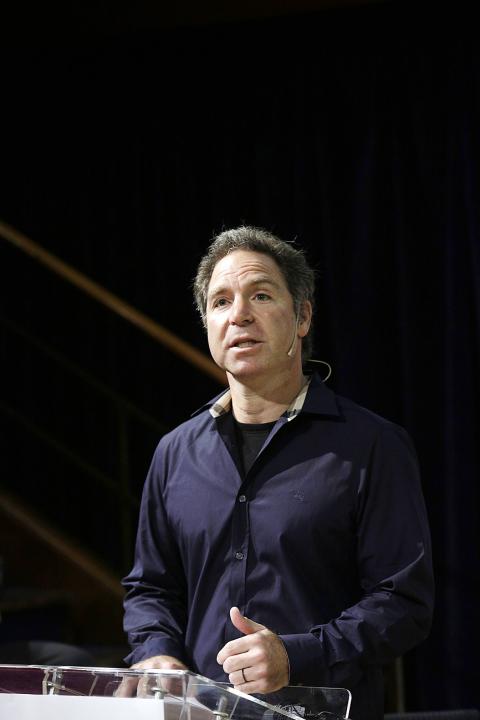Privately owned OneWeb Ltd on Thursday announced what it called the world’s largest commercial rocket deal after raising US$500 million from a group of global investors to support its plans to bring broadband to billions of people via satellite.
The fund-raising attracted backing from Richard Branson’s Virgin Group and Europe’s Airbus Group — which is also set to build 900 “micro-satellites” designed to extend the reach of the Internet to remote corners of the world.
OneWeb plans to put a network of 648 small satellites into orbit to provide global broadband and mobile telephone services. The rest of the satellites would be kept on the ground as spares.

Photo: Bloomberg
The company, based in Britain’s Channel Islands, plans more than 65 launches, including 39 from Virgin’s spaceflight company, Virgin Galactic, and 21 from Europe’s Arianespace using Russian-made Soyuz rockets.
It has estimated the cost of the project at between US$1.5 billion and US$2 billion.
Other backers in the US$500 million funding include Indian billionaire Sunil Mittal’s Bharti Enterprises, Qualcomm Inc, Coca-Cola Co, Mexico’s Grupo Salinas and Hughes Network Systems LLC, a unit of EchoStar and Intelsat.
“The funding will last several years,” OneWeb chief executive Greg Wyler said at a briefing in London on Thursday. “We’ll need one more round: turns out there are several people interested that we didn’t bring in this round.”
Virgin Galactic expects to be able to fly two or three of OneWeb’s satellites at a time on its small LauncherOne rocket, Virgin Galactic CEO George Whitesides said.
LauncherOne flies on a carrier jet aircraft called WhiteKnightTwo, which serves as a high-altitude launch platform. Terms of the contract were not disclosed. Virgin has said LauncherOne would cost less than US$10 million per flight.
OneWeb, which plans to start launching satellites from 2017 and aims to start services in 2019, must put its proposed network of low-Earth orbit, geosynchronous satellites into space before 2020, or risk losing licenses awarded by international radio spectrum regulators.
Airbus Space and Defence has formed a joint venture with OneWeb to build a high-volume satellite production factory.
OneWeb’s goal is to provide affordable broadband Internet services to rural and under-served regions, enabling voice and data communications via user terminals on the ground.
Before starting OneWeb, Wyler cofounded satellite venture O3b Networks and briefly worked at Google Inc on another project to beam Internet access from space.
Wyler left Google last year to work on his own satellite project, named WorldVu, which later became OneWeb.
Google, along with Fidelity, invested US$1 billion earlier this year in another Internet-via-satellite project being developed by California-based SpaceX, which was founded by Tesla Motors Ltd chief executive officer Elon Musk.
Additional reporting by Bloomberg

MULTIFACETED: A task force has analyzed possible scenarios and created responses to assist domestic industries in dealing with US tariffs, the economics minister said The Executive Yuan is tomorrow to announce countermeasures to US President Donald Trump’s planned reciprocal tariffs, although the details of the plan would not be made public until Monday next week, Minister of Economic Affairs J.W. Kuo (郭智輝) said yesterday. The Cabinet established an economic and trade task force in November last year to deal with US trade and tariff related issues, Kuo told reporters outside the legislature in Taipei. The task force has been analyzing and evaluating all kinds of scenarios to identify suitable responses and determine how best to assist domestic industries in managing the effects of Trump’s tariffs, he

In a small town in Paraguay, a showdown is brewing between traditional producers of yerba mate, a bitter herbal tea popular across South America, and miners of a shinier treasure: gold. A rush for the precious metal is pitting mate growers and indigenous groups against the expanding operations of small-scale miners who, until recently, were their neighbors, not nemeses. “They [the miners] have destroyed everything... The canals, springs, swamps,” said Vidal Britez, president of the Yerba Mate Producers’ Association of the town of Paso Yobai, about 210km east of capital Asuncion. “You can see the pollution from the dead fish.

TIGHT-LIPPED: UMC said it had no merger plans at the moment, after Nikkei Asia reported that the firm and GlobalFoundries were considering restarting merger talks United Microelectronics Corp (UMC, 聯電), the world’s No. 4 contract chipmaker, yesterday launched a new US$5 billion 12-inch chip factory in Singapore as part of its latest effort to diversify its manufacturing footprint amid growing geopolitical risks. The new factory, adjacent to UMC’s existing Singapore fab in the Pasir Res Wafer Fab Park, is scheduled to enter volume production next year, utilizing mature 22-nanometer and 28-nanometer process technologies, UMC said in a statement. The company plans to invest US$5 billion during the first phase of the new fab, which would have an installed capacity of 30,000 12-inch wafers per month, it said. The

Taiwan’s official purchasing managers’ index (PMI) last month rose 0.2 percentage points to 54.2, in a second consecutive month of expansion, thanks to front-loading demand intended to avoid potential US tariff hikes, the Chung-Hua Institution for Economic Research (CIER, 中華經濟研究院) said yesterday. While short-term demand appeared robust, uncertainties rose due to US President Donald Trump’s unpredictable trade policy, CIER president Lien Hsien-ming (連賢明) told a news conference in Taipei. Taiwan’s economy this year would be characterized by high-level fluctuations and the volatility would be wilder than most expect, Lien said Demand for electronics, particularly semiconductors, continues to benefit from US technology giants’ effort